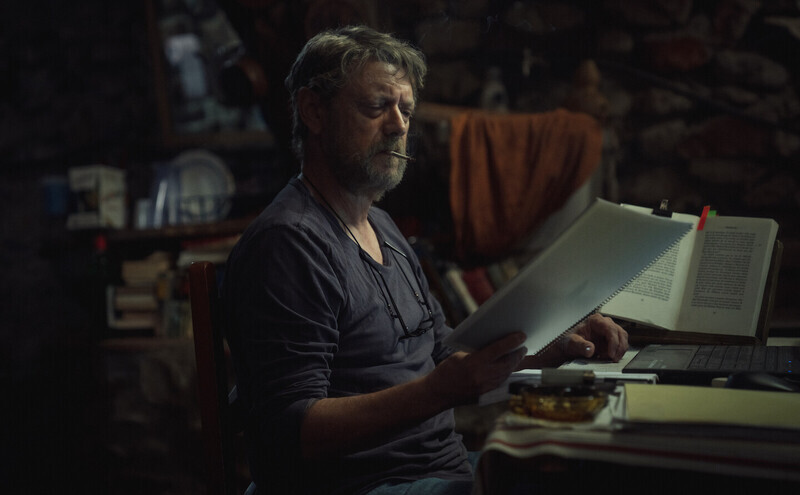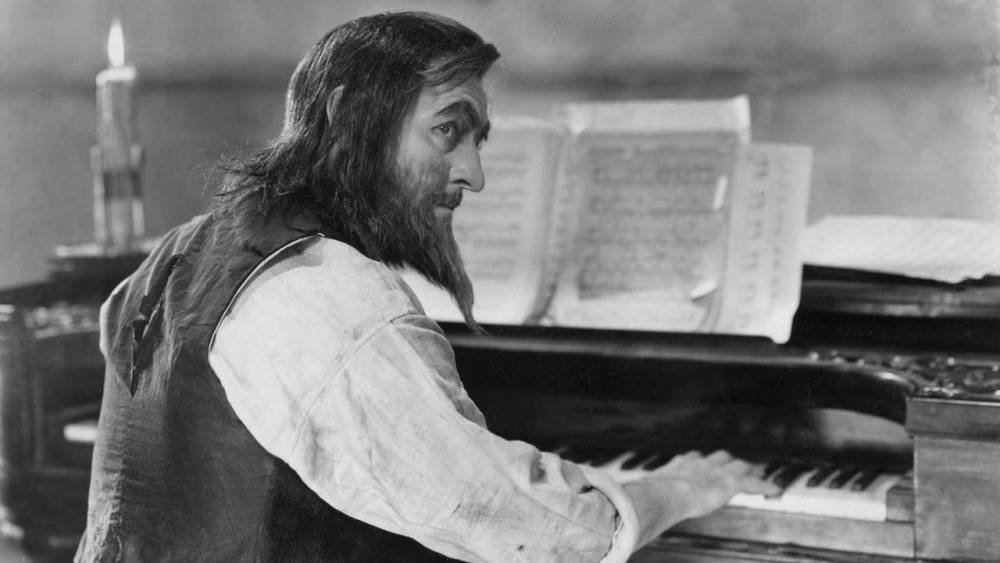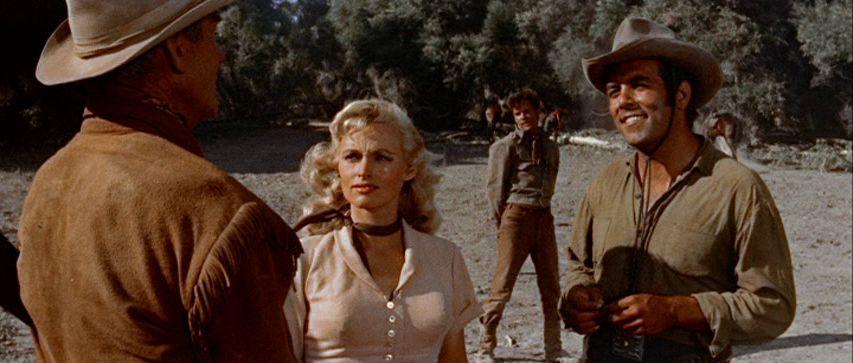Close Your Eyes (2023)
![]()
Close Your Eyes (2023) Directed by Victor Erice
Memories are an intricate, intangible compilation of experiences that once took place in some temporal space of our lives; the construct of memory as emotional receptions of the human experience is very much akin to the ontology of celluloid – the nitrocellulose material from which film is made – an inflammable and delicate material, sustainable but easy to deteriorate over time. Just like the celluloid in which all the greatest masterpieces of cinema are imprinted, the human brain is impregnated with memories, recollections of specific and non-specific moments of our existence. The art of motion pictures captured on celluloid confers a singular identity to the filmstrip which, before being exposed to light at 24 frames per second, was in a photographically virgin state, blank, without remembrance. The memories that our brain stores and treasures just as it is the case with celluloid are the ones that finally form our identity. The transcendence of this analogy, between memory and cinema, can be understood and experienced with better lucidity in Victor Erice’s monumental new opus Cerrar Los Ojos than in this write-up, in which I sincerely doubt I can do justice to the sheer enormity of cinema contained in this profound conversational drama.
After 30 years of directorial inactivity in the full-length format, the master of Spanish cinema returns to conjure up one of the densest personal dissertations of his career. When he made his debut feature, the startling The Spirit of the Beehive (1973), which is a lofty metaphorical meditation on Francoist Spain as seen through the eyes of a young Ana Torrent, only 6 years old, Victor Erice startled the world with his peerless talent to craft audiovisual miracles with only sober framing and silent compositions. Erice’s camera was capable of surveying the world as if it were a tragic fable. His second feature, not as perfect as the first but nonetheless equally magisterial, the genuinely moving and poetic El Sur (1983), continued to elucidate the Spanish director’s tremendous ingenuity in making cinema a poignant mimetic projection of who we are. El Sol del Membrillo, a stunning 1992 documentary, was his last film up to that point. I never thought the day would come when I would write “the new Victor Erice film”, but here we are and with a terrific new Erice film no less; if there is a meritorious way to return to cinema, it is with Cerrar Los Ojos.
It is a film of unfathomable beauty, almost like a mythological artwork, in which its mysteries grow so elusive and speculative that the film itself seems like a legend. The octogenarian Spanish filmmaker returns with the desire to articulate a meta-narrative that attempts to provide him with the answers that I believe his other features and short films over the years have not yet been able to answer his concerns. This Spanish-Argentine production is Erice’s intellectual effort to grasp cinema through the human experience, not vice versa as he does in his earlier films. To this end, he embarks on a laborious filmmaking endeavor, writing with Michel Gaztambide the densest script he has ever written in his career. The experimental irony that occurs in Cerrar Los Ojos is that it is a verbose story – an epic colloquy of characters filmed with the most understated and placid visual compositions you will ever see – unlike his other films which are formidable visual narrations, sparse dialogue and pure form. One of the unequivocal explanations why Erice opted for such a loquacious system of filmmaking and abandoned his purist dynamic as an artist of the cinematic image is because the complexity of the story demands philosophical oratory. The language of the script is simple, it is a prose intelligible to anyone, the subtext of the dialogues and the metaphysics evoked by the conversational iterations between the characters therein lies the depth of this epic.
A movie within a movie. Thus, the plot opens its doors to a story of mystery through the fragmented passages of different characters that unite them in the same search: that of Julio Arenas (Jose Coronado), a film actor who disappeared without a trace while shooting a movie in the nineties. The first few minutes we see belong to that truncated film in which the now disappeared Julio acted. Twenty years later, a rather tendentious TV show seeks to revive the case of the missing actor with a reportage, in which they hire to interview Julio’s film director and personal friend, Miguel Garay (movingly played by Manolo Solo), who also directed that unfinished movie in the nineties. At first, Miguel makes his intentions clear, he agrees to this interview and exchange information about Julio for money. However, his helpful, gentle and furrowed face gesticulates a great deal of nostalgic tension; participating in this interview gives him the opportunity to reminisce about his past life with the movies. The atmosphere in which the plot evolves is stealthy and extremely patient, religiously patient in fact. With this minimalist dynamic at its core, the drama utilizes more the methodology of a thriller than that of a pretentious languorous arthouse; the art of the plot is in creating an aura of irresistible mystery. There comes a point in the quasi-journalistic system of filming, where the compositions are frames of interviews manipulated with orthodox shot/reverse shots and two shots, right here is when they end up mythologizing the figure of Julio Arenas, the missing actor. Doing that simple interview with an incisive reporter that forced him to remember many events that happened with Julio, arouse in Miguel a substantial interest in wanting to give a meaning to the disappearance of his friend. This is when the film ceases to be a lengthy colloquy and begins to get its best version out of that vital verbal exposition. The experience ceases to be exclusively of Miguel as the former film director trying to understand the mystery of the disappearance, now that onerous experience becomes so much a part of us that we end up being part of the rich conversations as well.
Erice’s script compels you to reflect on yourself throughout the existential crisis that gradually settles into the peaceful, austere compositions. One comes to interrogate one’s role in the past, present and future as a human being as Miguel delves deeper and deeper into the disappearance of his friend. Miguel, like every individual at some stage in his life, encounters questions of identity, questions his role as a filmmaker, his role as Julio’s friend, and his status as a man who must bear the burden of a tragedy from the past. As he converses with various characters close to Julio, among them Julio’s daughter Ana (Ana Torrent), Miguel faces a whirlwind of emotions that transcends the simple search for an actor, it is a quest for himself, for his inner self. The tone of the plot is perpetually sublime, but within its sublimity there are disturbances, there are feelings that stimulate the emergence of individual demons. By this I mean that watching Cerrar Los Ojos is a therapy with yourself, in which you will spontaneously challenge your current situation by confronting it with that of the past and the future; it is a scary but salutary meditation with yourself. Erice’s greatest achievement in fashioning such a meaningful story is to make Miguel’s experience of life’s complexities universal. Admittedly, it is Erice’s most intimate film, but it is also one of his most generous films because by sharing his experience and making it universal, he allows his audience to feel as much a part of his universe as Erice did in the materialization of his screenplay.
But everything revolves around the concept of memory and the symbiotic relationship it has with cinema. It is not for nothing that the story is nourished by the more cultural and psychological notion of cinema as art; and Erice has faith that cinema is the medium par excellence for exploring reminiscences. There is something wonderfully sweet in the thought that cinema can reestablish a person’s identity by activating the innermost recesses of the human mind. Simply put, this work of personal reconciliation, love for the profession of filmmaking, identity introspection and human empathy has as its philosophical credo that film has the potential to recover someone’s memory – in this case Julio’s but also to a large extent Miguel’s in his tireless pursuit of truth. The contemplative serenity of Erice’s visual scheme is reminiscent of his past works, but clearly the inflated prominence of dialogue makes this his first dialogue film. At first, this sluggish effect of its conversational structure feels disconcerting, but then it all makes sense when the thesis is summed up in its breathtakingly poignant finale, in which we witness the last reel of Miguel’s film and Julio’s last performance. Erice assembles his characters in a modest movie theater with analog projection. The cozy darkness of the theater engulfs the characters with a mystery, an enigma that is about to be deciphered. The filmmaking in this touching sequence opts for an uncommon emotional candor – reaction shots before the beauty of the truncated masterpiece they were part of, transformed into evocative framing, perplexed countenances associating their present with the past – what they see is the denouement of the first sequence we saw in the film’s introduction. We foresee an act of redemption so sublime, so supreme, so immaculate that we fervently believe in the power of moving images as the most effective therapeutic medium there can be.
The wisdom of Erice’s film lies in not succumbing to the grandiloquence of a phony sentimental spectacle, rather it does not allow for trickery and boldly enters a zone of mystifying realism, the ending does not clarify what is going on in the minds of the characters – do the memories now make sense? or has the truth just been revealed? we don’t know and I’m sure Erice doesn’t either because he wanted it that way, an ending so frustratingly ambivalent that it is perfect. Cerrar Los Ojos may be replete with visual prowess, symbols that want to be decoded, yet the loquacity of the dialogues carry the whole film; they act as the verb of cinema no longer as a narrative mechanism, perhaps – as the title well declares – we should close our eyes to hear with delicacy the poetry it conceals. Memories and cinema, a rich interplay of mechanical and human, psychological and philosophical functions, both telling the story that Victor Erice was born to direct. It feels like one of the most imposing and elusive masterpieces you’ll ever see, but I’ll settle for saying it’s Erice’s finest film since The Spirit of the Beehive. That’s for sure.






